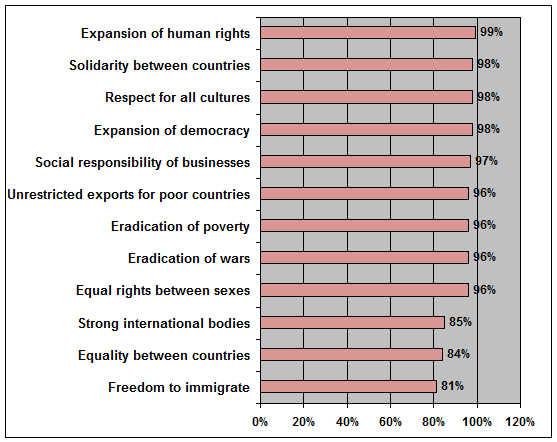TWENTIETH EDITION OF THE BAROMETER OF THE ELCANO ROYAL INSTITUTE (March-April 2009)
Press Summary
Technical Data
FIRST WAVE
- Universe: general Spanish population, age 18 and over.
- Sample size: N = 1,200 interviewees.
- Interview method used: telephone (interviewee called at home).
- Sample size: stratified, directly proportionate to the distribution of the national population and with proportionate quotas according to sex and age.
- Sample error: ±2.9% for global data (1,200n); ±4% for sub-samples (800n), p = q = 0.5 and a confidence interval of 95.5%.
- Survey period: from2 March to 16 March 2009.
- Fieldwork: Gabinete de Análisis Demoscópico (GAD)
SECOND WAVE
- Universe: general Spanish population, age 18 and over.
- Sample size: N = 600 interviewees.
- Interview method used: telephone (interviewee called at home).
- Sample size: stratified, directly proportionate to the distribution of the national population and with proportionate quotas according to sex and age.
- Sample error: ±2.9% for global data (600n), p = q = 0.5 and a confidence interval of 95.5%
- Survey period: from 14 April to 17 April 2009.
- Fieldwork: Gabinete de Análisis Demoscópico (GAD)
DEFENCE, NATO AND AFGHANISTAN
- Most Spaniards think that all missions abroad involve danger.
How dangerous is it for Spanish troops on the following missions in…?
– Very dangerous
– Considerably dangerous
– Somewhat dangerous
– Not at all dangerous
Graph 1. Degree of danger for Spanish troops
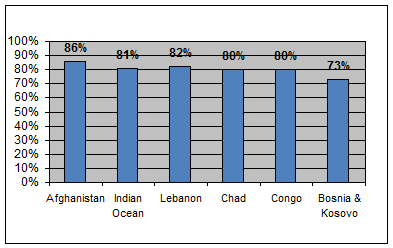
- Despite this perceived threat, there is a balance between positive and negative opinions regarding troop presence.
What is your opinion of the presence of Spanish troops in…?
– Very positive
– Positive
– Negative
– Very negative
Graph 2. Positive opinion of the presence of Spanish troops
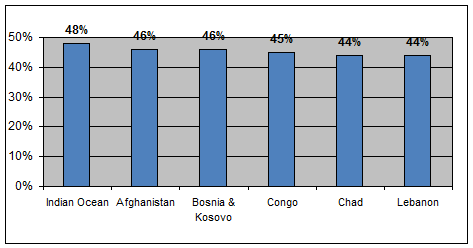
- The mission with the highest opinion is the fight against piracy (48%) in the waters off Somalia. Not in vain, 56% believe that the piracy problem affects Spain’s security and interests.
Do you think that the problem of piracy off the waters of Somalia affects Spain’s security and interests a lot, significantly, a little or not at all?
Graph 3. Effect of piracy off Somalia on Spain’s security and interests
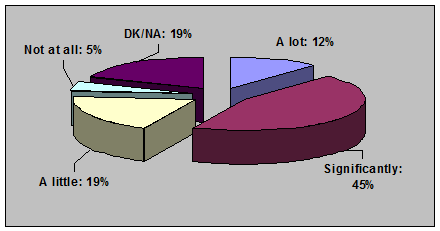
- Specifically regarding the mission in Afghanistan, the data are slightly better in comparison with the last wave, with 51% against (3 percentage points less) and 46% in favour (5 percentage points more).
Graph 4. Evolution of the evaluation of Spanish troop presence in Afghanistan
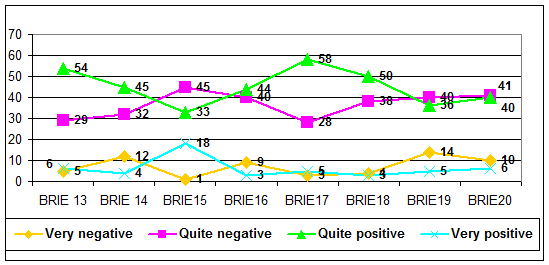
- Spaniards have a very negative opinion of the situation in Afghanistan, in all aspects: the status of women, control of drug production, government stability, etc.
What is your opinion of Afghanistan in the following aspects?
– Level of well-being of the civil population
– Government stability
– Security and public order
– Status of women
– Control of drug production
– Relationships between ethnic groups and religious groups
Graph 5. Opinion of Afghanistan: negative or very negative response (%)
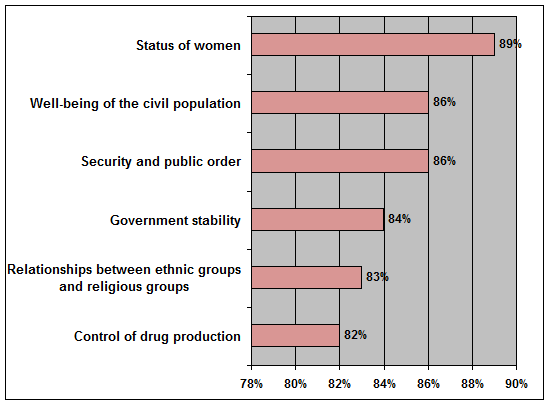
- It is no surprise then that 67% defend a new strategy of institutional strengthening and development cooperation.
There are those who think that matters should continue as they have up to now in Afghanistan with the strategy of security and reconstruction, and others who think that a new strategy of institutional strengthening and development cooperation is needed. What is your opinion?
– No change
– New strategy
Graph 6. Should there be a new strategy of institutional strengthening and development cooperation in Afghanistan?
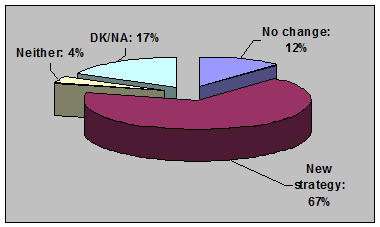
- Consequently, 60% of Spaniards have a positive opinion of the results of the NATO Summit.
What is your opinion of the results of the following international event: very positive, positive, negative or very negative?
– The NATO Summit
Graph 7. Result of the Nato Summit
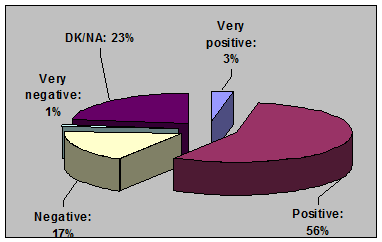
- Consequently, after the NATO Summit, 60% have a positive opinion of the ‘new NATO strategy of institutional strengthening and development cooperation for Afghanistan’.
What is your opinion about NATO’s new strategy of institutional strengthening and development cooperation for Afghanistan?
– Very good
– Good
– Bad
– Very bad
Graph 8. Opinion of the new NATO strategy in Afghanistan
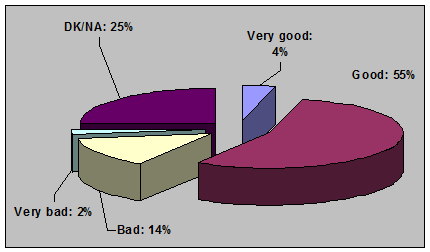
- Before the Summit, only 4% of Spaniards seemed to support sending more troops, although as a whole the majority supported maintaining the current troops and only 39% supported complete withdrawal.
And regarding Spanish troops in Afghanistan, do you think that they should…
– Be increased?
– Be maintained?
– Be decreased?
– Be withdrawn completely?
Graph 9. Should Spanish troops be…?
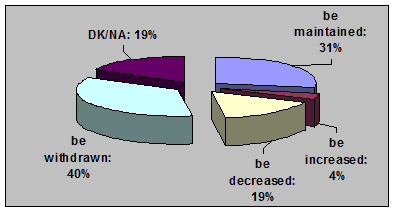
- After the NATO Summit, 46% approve of sending more troops to support the Afghan elections.
What do you think about sending Spanish troops to support Afghan elections?
– Very good
– Good
– Bad
– Very bad
Graph 10. Opinion on sending more Spanish troops to support the Afghan elections
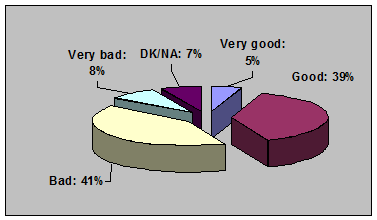
- 58% agree with contributing financially to the reconstruction and development of Afghanistan.
- Going to another question, 70% have a positive opinion of the announcement of withdrawing Spanish troops from Kosovo.
To begin with, what is your opinion about the announcement that Spanish troops would be withdrawn from Kosovo?
– Very good
– Good
– Bad
– Very bad
Graph 11. Opinion of withdrawing Spanish troops from Kosovo
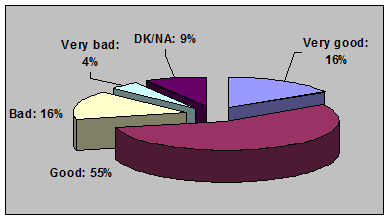
- Less than half of Spaniards (43%) think that it has hurt relations with the US.
Do you think that this troop withdrawal benefits or hurts Spain’s relations with the US?
– Benefits
– Hurts
– Neither benefits nor hurts
Graph 12. How does Spain’s troop withdrawal affect relations with the US?
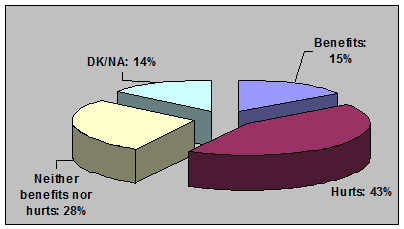
- There is a clear difference between voters of the left and right, as the former think that troop withdrawal does not hurt relations with the US, while the latter think that it does.
Graph 13. Opinion about whether or not the withdrawal of Spanish troops from Kosovo hurts relations with the US, depending on ideological preference
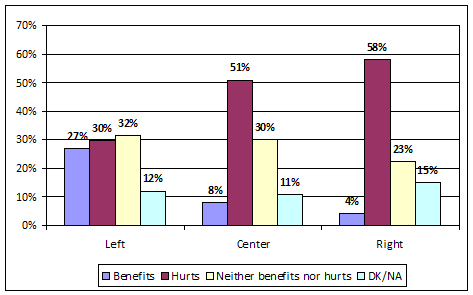
RELATIONS WITH THE US
- To improve relations with the US, two out of three Spaniards think that it would be good for Spain to mediate between the US and Muslim countries or between the US and Cuba.
- 55% also agree with contributing financially to the reconstruction of Iraq.
- However, 63% reject the possibility of accepting Guantánamo prisoners in Spain, opening up more US military bases in Spanish territory or purchasing weapons from the US.
I shall read a series of actions to improve relations between Spain and the US. Tell me if you would agree or disagree:
– Accepting prisoners from Guantánamo in Spain.
– Contributing financially to the reconstruction of Afghanistan.
– Contributing financially to the reconstruction of Iraq.
– Sending more Spanish troops to Afghanistan.
– Helping to improve the situation of Hispanics in the US.
– Mediating between the US and Cuba.
– Mediating between the US and Muslim countries.
– Increasing Spain’s contribution to NATO.
– Purchasing weapons from the US.
– Facilitating US investment in Spain.
– Allowing more US bases to be opened in Spain.
Graph 14. Percentage of agreement to actions to improve relations with the US
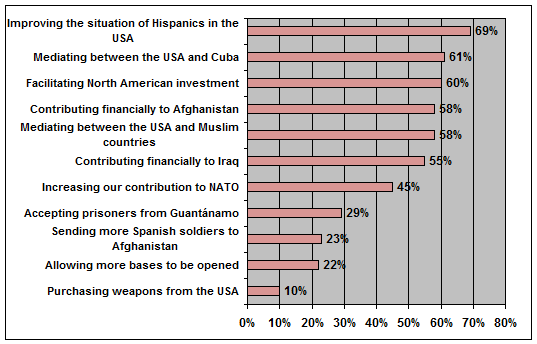
- There is unanimity with respect to Obama: 95% have a positive opinion of his record during the time that he has been in office.
What is your opinion of Obama’s record during his first month in office?
– Very good
– Good
– Bad
– Very bad
Graph 15. Opinion of Obama’s first month in office
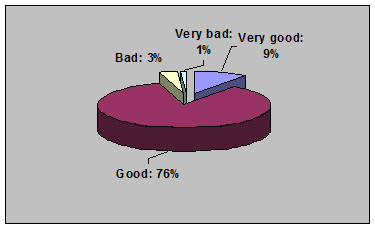
- Obama also stands out as the international leader rated the highest, with a rating of 7, which is three times higher than the lowest-rated, Hugo Chávez, who receives a 2. Obama consolidates his position as an international leader, far ahead of the rest. Conversely, Sarkozy seems to have lost some wind.
Graph 16. Evolution of the average rating of leaders, BRIE 16 to 20
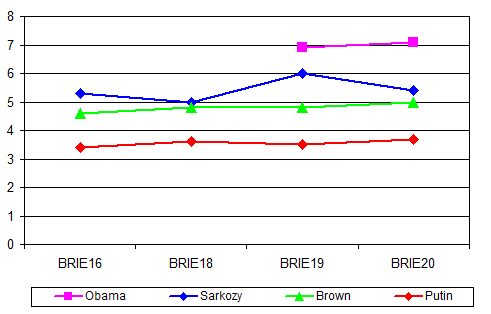
- Regarding Hugo Chávez, 80% of Spaniards have a negative opinion of the fact that the Bolivarian leader won the referendum that will allow him to run for re-election as President of Venezuela.
THE EU AND THE SPANISH PRESIDENCY
- Although only one in five know which country presides over the EU this semester, among those who do know, the Czech President Vaclav Klaus receives a rating of only 4.
- 38% think that the Lisbon Treaty will be ratified, versus 24% who think that it will not.
Graph 17. Do you think the Constitutional Treaty (of Lisbon) will be ratified in all countries of the EU?
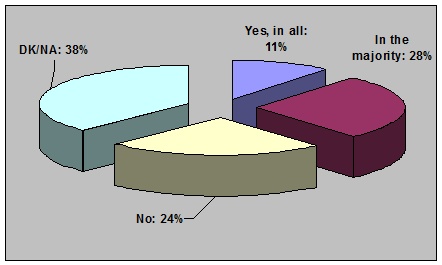
- With only one year to go before the Spanish presidency of the EU, in the first semester of 2010, only one out of four Spaniards know that it is going to occur.
- Spaniards have a positive opinion of the objectives established for the Spanish presidency.
Spain has proposed a series of objectives for its EU Presidency in 2010. Do you think that each of these subjects is very, significantly, somewhat or not-at-all important?
– Gender equality
– Strengthening relations with the US
– The fight against the international financial crisis
Graph 18. Importance of objectives of the Spanish EU Presidency
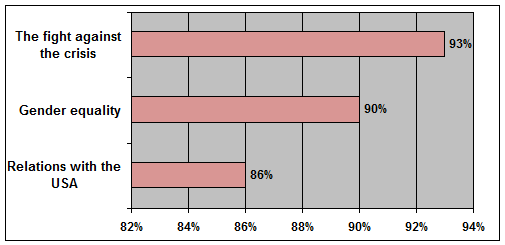
- However, given the concern about the economic situation, for two out of every three Spaniards, the priority objective should be the fight against the international financial crisis, far ahead of gender equality (24%) and relations with the US (4%).
Graph 19. Which of these objectives is most important?
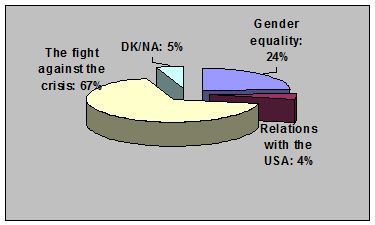
- 65% of Spaniards think that European countries are not cooperating in the fight against the crisis and that each one is going its own way.
Graph 20. Would you say that European countries are cooperating in the fight against the financial crisis or, conversely, are they each going their own way?
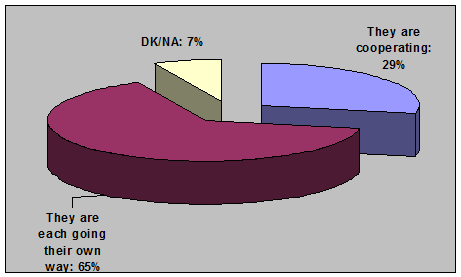
SOLUTIONS TO THE CRISIS
- 54% of Spaniards understand that it is a structural crisis, versus only 25% who think that it is a cyclical problem that does not affect the foundations of the system.
- Regarding possible solutions to the crisis, the overwhelming majority of Spaniards (80%) is in favour of eliminating tax havens, reforming the international financial system and limiting the salaries of bank executives.
I shall read to you a series of measures that have been discussed to solve the economic crisis. Tell me if you are in favour or against:
– Nationalising banks
– Eliminating tax havens
– Reforming the international financial system
– Limiting the salaries of bank executives
– Creating banks that acquire toxic funds
Graph 21. Most favoured measures to combat the crisis
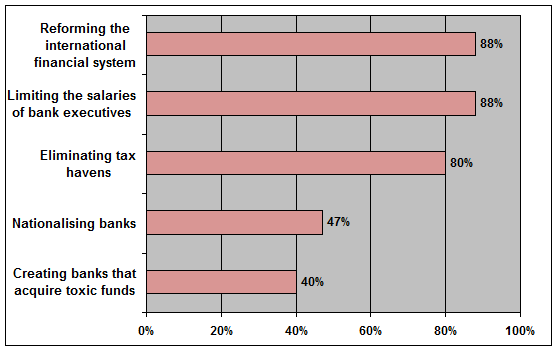
- 69% also think that Spaniards should consume Spanish products to fight the economic crisis in Spain.
Tell me if you agree or disagree with the following statements:
– The government should limit imports of products from non-EU countries.
– Spaniards should consume Spanish products to fight the crisis.
– Free trade means that better products coming from abroad are available in Spain.
– Immigration is good for a country’s economy.
Graph 22. Approval of further measures to combat the crisis
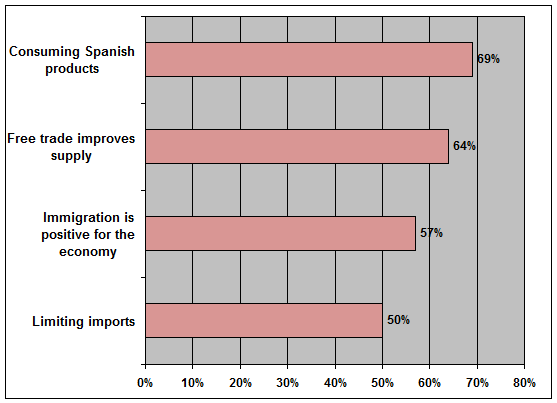
- There is a greater division of opinions about nationalising banks, supported by 47% and rejected by 38%.
- 73% of Spaniards believe that the US will continue to be the world’s leading power after the international financial crisis.
- Regarding the London Summit, 65% of Spaniards have a positive opinion of its results.
What is your opinion about the results of the following international event (very positive, positive, negative or very negative)?
– The G20 London Summit
Graph 23. Opinion of the G20 London Summit
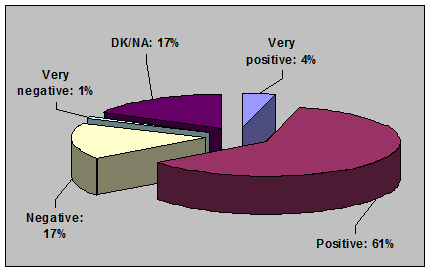
- 40% think that it was better than the Washington Summit, versus only 13% who think that it was worse. In this regard, the percentage of Spaniards who believe that the Summit will contribute to solving the crisis has increased very significantly.
- Before the London Summit, 64% of Spaniards had a positive opinion about Spain’s attendance. After the Summit, 70% also had a positive opinion about Spain’s role at the Summit.
What is your opinion (very positive, positive, negative or very negative) about Spain’s participation in…?
– The G20 London Summit
Graph 24. Opinion about Spain’s participation at the G20 Summit in London
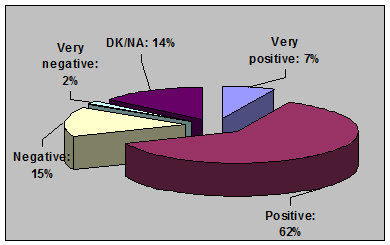
- It should be pointed out that the opinion is positive among voters of both the PSOE and the PP.
Graph 25. Opinion of Spain’s participation in the G20 London Summit according to the reported vote in the 2008 general elections
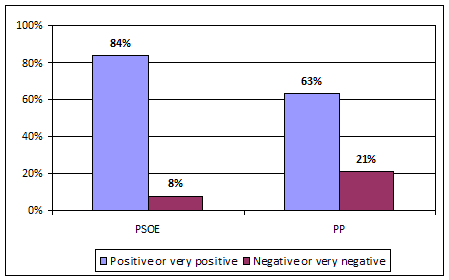
IMMIGRATION
- Within the context of the current crisis, 70% of the respondents think that it is important for Spanish companies to hire Spanish workers.
When companies in Spain hire workers, how important is it that those workers be Spaniards?
– Very important
– Quite important
– Somewhat important
– Not at all important
Graph 26. Is it important to hire Spanish workers?
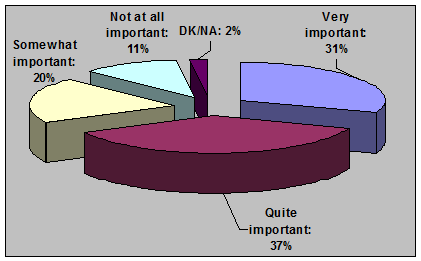
- However, 60% of Spaniards think that Spanish companies should first hire the most qualified worker, and only 25% think that they should hire Spaniards even though they might be less qualified than foreign workers.
When companies in Spain hire workers, what criterion do you think should prevail?
– The most qualified over the least
– Spanish over foreign
Graph 27. Which worker should be hired?
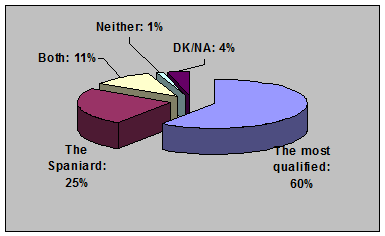
HUMAN RIGHTS AND GLOBAL JUSTICE
- Despite the adverse economic juncture, Spaniards continue to show their proverbial solidarity and commitment to human rights: 47% believe that there should be further advances in the fight against human rights violations violations.
This year is the 60th Anniversary of the Universal Declaration of Human Rights. Do you think that there have been advances in the fight against violations of human rights during this time?
– Many
– A significant number
– Some
– None
Graph 28. Improvements in human rights
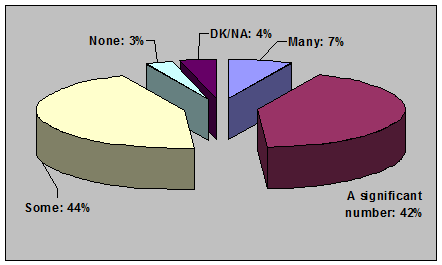
- In this regard, 90% approve of the Human Rights Plan to promote human rights in the world.
What is your opinion of the plan?
– Very good
– Good
– Bad
– Very bad
Graph 29. Opinion of the Human Rights Plan
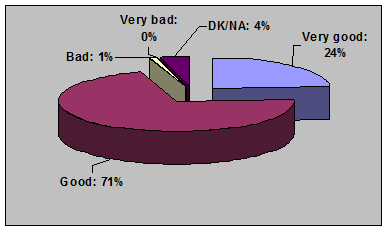
- The vast majority defend international cooperation, human rights, peace and gender equality as the foundations of a more just global society.
I shall read you a series of principles and values. For each one, tell me the importance that you would give to achieve a just international order:
– Strong international bodies.
– No power or country is stronger than any other.
– People can emigrate where they want without barriers.
– There is no poverty in the world.
– There are no wars.
– Women have the same rights as men.
– Rich countries help poor ones.
– Human rights are respected throughout the world.
– Poor countries can export to rich ones without trade barriers.
– All values and cultures are respected.
– There is democracy in all countries.
– Multinationals contribute to the development of the countries where they invest.
Graph 30. Most important principles and values
